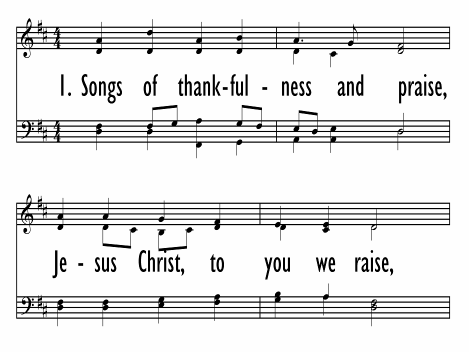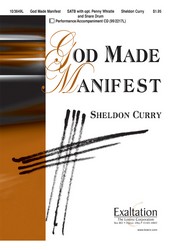- |
User Links
Songs of Thankfulness and Praise
Hymn Information
- First Line
- Songs of thankfulness and praise
- Author
- Christopher Wordsorth (1862, alt.)
- Tune Name
- SALZBURG
- Composer
- Jakob Hintze, 1622-1702
- Harmonizer
- Johann S. Bach, 1685-1750 (alt.)
- Topic
- Biblical Names and Places: Bethlehem · Biblical Names and Places: David · Biblical Names and Places: Jordan River · Church Year: Epiphany · Church Year: Baptism of Our Lord · Powers of Darkness · Jesus Christ: Healer · Jesus Christ: Incarnation · Jesus Christ: Miracles · Music and Singing · Praise of Christ
Copyright Information
- Text Copyright
- Public Domain
- Tune Copyright
- Public Domain
- Reprint/Projection Information
- Words and Music: The Words and Music are in the Public Domain; you do not need permission to project or reprint the Words and Music.
Full Text
Scripture References
- · · · · · · ·
Further Reflections on Scripture References
Taking Matthew 1: 1-11 as his theme for stanzas 1-3, Dix likens the journey of the wise men who came to worship the Christ to our own Christian pilgrimage. The pattern of these stanzas is "as they … so may we." Stanzas 4 and 5 are a prayer that our journey on the "narrow way" may bring us finally to glory where Christ is the light (Rev. 21:23) and where we may perfectly sing his praise.
Psalter Hymnal Handbook
Confessions and Statements of Faith References
Further Reflections on Confessions and Statements of Faith References
Throughout stanza 2, Jesus is manifested as “prophet, priest and king supreme”; using parallel language, Heidelberg Catechism, Lord’s Day 12, Question and Answer 31 explains that Jesus is “anointed with the Holy Spirit” to be our “chief prophet and teacher,” our “only high priest” and our “eternal king.”
The refrain ends by confessing that “God in flesh [is] made manifest.” Heidelberg Catechism, Lord’s Day 14, Question and Answer 35 also confesses that Jesus “took to himself, through the working of the Holy Spirit, from the flesh and blood of the virgin Mary, a truly human nature...”
Songs of Thankfulness and Praise
Call to Worship
Assurance
Blessing/Benediction
Additional Prayers
Songs of Thankfulness and Praise
Tune Information
- Name
- SALZBURG
- Key
- D Major
- Meter
- 7.7.7.7 D
Recordings
Musical Suggestion
- Stanza 1: choir and congregation in unison
- Stanza 2: choir in parts, perhaps using the more elaborate Bach setting, found in Rejoice in the Lord #251, The Hymnal 1940 #53, or the new Hymnbook 1982 #135
- Stanza 3: congregation and choir in unison or harmony (or, for an easier choral variation, the women of the choir can sing the tenor line an octave up, with the men on the melody).


 My Starred Hymns
My Starred Hymns






